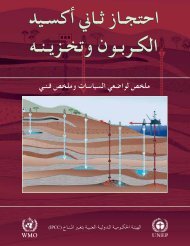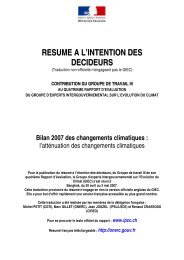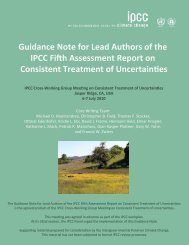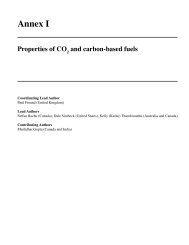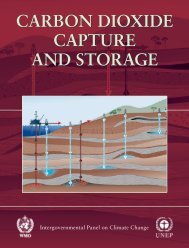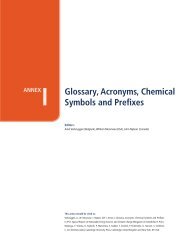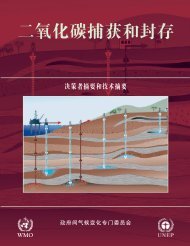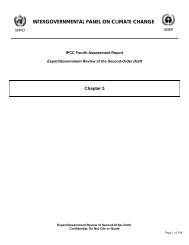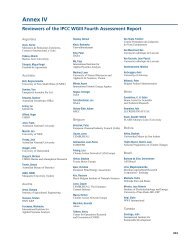SODBatch A&B SPM Comments co-chair response final ... - ipcc-wg3
SODBatch A&B SPM Comments co-chair response final ... - ipcc-wg3
SODBatch A&B SPM Comments co-chair response final ... - ipcc-wg3
Create successful ePaper yourself
Turn your PDF publications into a flip-book with our unique Google optimized e-Paper software.
Chapter-<br />
Comment<br />
<strong>SPM</strong>-<br />
302<br />
<strong>SPM</strong>-<br />
303<br />
<strong>SPM</strong>-<br />
304<br />
para<br />
Batch<br />
From Page<br />
From Line<br />
To Page<br />
To line<br />
<strong>Comments</strong><br />
IPCC WGIII Fourth Assessment Report, Se<strong>co</strong>nd Order Draft<br />
(Government of Environment Canada)<br />
4 A 4 17 4 24 The <strong>SPM</strong>'s use of terms like "energy security" and sustainability are<br />
rather sloppy and not defined. For example, through out the<br />
numerous references to energy security, I can not understand if the<br />
authors of the <strong>SPM</strong> believe that heightened <strong>co</strong>ncern about energy<br />
security will lead to lower emissions or higher emissions of<br />
greenhouse gases. As this is supposed to be an assessment of the<br />
literature pertaining to climate change and how to address it, this is<br />
a significant omission. If <strong>co</strong>untries with large <strong>co</strong>al deposits adopted<br />
large scale <strong>co</strong>al to liquids programs that would undoubtedly lead to<br />
higher emissions. Rather than throwing around terms like "energy<br />
security" please stick to what the literature tells us about how that<br />
might or might not impact mankind's ability to address climate<br />
change.<br />
(James Dooley, Battelle)<br />
4 A 4 17 4 19 replace "Policies related to climate change, energy security and<br />
supply, and sustainable development, has led to emissions lower<br />
than baseline projections in some regions, but this reduction is not<br />
large enough to significantly affact the global emissions trend" with<br />
"Climate out<strong>co</strong>mes are influenced not only by the climate specific<br />
policies, but also by the development pathways, witch are not<br />
simply the result of previous policies or decisions of governments,<br />
but are also influenced by the dispersed decisions and embedded<br />
practices at all levels of society"<br />
(Yuan Guo, Energy Research Institute, National Development and<br />
Reform Commission)<br />
4 A 4 17 4 23 This statement basically says that emissions in some regions may<br />
have been lower than estimated before and higher in others. Not<br />
very interesting. I propose to drop this statement. Or, if the authors<br />
are really sure that the lower numbers are due to policies and the<br />
higher numbers elsewhere can be explained because in those<br />
regions NO policies have been implemented, this latter point would<br />
Expert Review of Se<strong>co</strong>nd-Order-Draft<br />
Confidential, Do Not Cite or Quote<br />
Response suggested by <strong>co</strong><strong>chair</strong>s<br />
AA; add words that energy<br />
security can also be negative for<br />
emissions (<strong>co</strong>al!); see also A-<br />
301<br />
REJ; too vague<br />
Maybe for 31/32?<br />
REJ; reductions are simply too<br />
small to show up in the global<br />
trend (it cannot be determined if<br />
there is a deviation from<br />
baseline, because the baseline is<br />
not defined)<br />
Action<br />
for<br />
chapter<br />
Considerations<br />
by the writing<br />
team<br />
TIA (Rick)<br />
(1)<br />
TIA (Rick)<br />
(1)<br />
TIA (Rick/Bill)<br />
– link to page<br />
p17 ff of<br />
Chapter 1<br />
(1)<br />
Page 75 of 348



